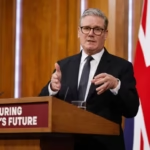The United Kingdom (UK) government on Monday officially announced plans to halt the care worker visa scheme, a decision met with fierce opposition from unions and care sector leaders.
This and many other major immigration reforms were contained in the UK immigration white paper, unveiled on May 12, 2025, earlier reported by Pan-Atlantic Kompass.
The white paper outlines measures to reduce net migration by banning new recruitment of overseas care workers and prioritizing domestic hiring to address staffing shortages.
Recall that the care worker visa, introduced in 2022 by the Conservative government, allowed overseas workers to fill critical staffing gaps in the UK’s social care system.
According to official data from the UK Home Office, in 2023 alone, over 58,000 individuals arrived UK through the care worker visa route.
These workers were said to be primarily from countries like Nigeria, Zimbabwe, India, and the Philippines.
However, Home Secretary Yvette Cooper, in her address while defending the care worker visa ban, argued that employers should recruit from the existing pool of care workers already in the UK.
Cooper said the policy is to ensure a shift toward higher-skilled migration and increased domestic training to reduce reliance on overseas labour.
She maintained: “Employers should be looking to hire from those already in the UK, including people on existing visas who are yet to be deployed.
“There’s also room to extend some visas, but we believe it’s time to draw the curtain on recruiting new care workers from abroad.”
This argument has been rejected by several unions in the UK, including Unison, the UK’s largest representing health and care workers.
Unison slammed the decision as shortsighted. Unison’s general secretary, Christina McAnea, highlighted the indispensable role of migrant workers, stating: “The NHS and care sector would have collapsed long ago without the thousands of workers who’ve come to the UK from overseas.”
She urged the government to clarify the status of current overseas workers and labelled care roles as “low-skilled.”
McAnea also called for the swift implementation of a fair pay agreement to make care jobs more attractive to UK workers, addressing chronic recruitment challenges.
“Thousands of migrant health and care workers have kept things running. Now, they are left confused and anxious about their future. The government needs to assure them they’ll not be kicked out,” she added.
Also reacting to the development, Professor Martin Green, CEO of Care England, lamented that the government’s decision amounts to “kicking the sector while it’s already down.”
Green asserted: “For years now, we’ve been surviving on limited resources, rising operational costs, and serious staffing gaps.
“International recruitment may not have solved all the problems, but it provided a much-needed lifeline. Taking that away now without offering any support or alternative is simply heartless.”





